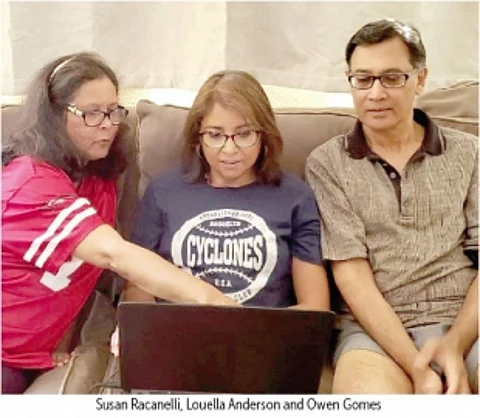

Dr Leo J De Souza regretted that the fact that he could not release the book in his lifetime, a story he said is not often heard. On his death bed, he made his daughter, Louella Anderson, his niece Susan Racanelli and nephew, Owen Gomes, promise him that they would work on the book and release it in the future. His dream is finally fulfilled as his book, ‘No Place for Me’ will be read across the world. “We worked on it over the last five years in our spare time and weekends,” says Louella Anderson.
“No Place For Me – A memoir of an Indian Doctor in East Africa’ is a story that will echo in the hearts of many Goans who lived in Africa especially in the countries of Tanzania, Kenya and Uganda. Dr Leo J De Souza was an orthopaedic surgeon who pursued a master’s degree in Creative Writing at Hamline University so he could pen down his story in the most vivid manner, making the narrative flow like a fresh stream of water. The book was also awarded for Best Nonfiction Thesis of the Year in 2002 at the completion of the course. The book has been divided into four major parts and has over 90 black and white photographs that date back to over a century. The book also includes a family tree of the House of Camoth and a map of the three countries of Tanzania, Kenya and Uganda to give a better understanding of his memoir.
Tracing his roots to Parra, Bardez, Dr Leo beautifully paints the landscape of Africa going back to his father’s arrival in the country and how families had to separate when education and livelihood were both given importance. Migration often comes with its own challenges and though Dr Leo called Tanganyika his home, the country didn’t accept him as their own. He faced discrimination as an Indian doctor in East Africa and had to ultimately flee to the USA after Idi Amin’s coup in 1971.
“The migration to East Africa and Hong Kong by our grandparents is something many families went through with success and challenges. As the title says, ‘No Place For Me’ being the wrong colour – not white nor black, the racial discrimination in colonial times (not white) and newly independent countries (not black) was a common and fairly accepted practice. Bias however, absence of merit, is never okay. A greater degree of meritocracy is what Dr Leo eventually found in the US, earning the respect and admiration of his colleagues and students as an orthopaedic surgeon and teacher. He was treated as an equal which is all he asked for,” says Louella.
After Dr Leo’s demise in 2016, just a few day prior to his 90th birthday, this team of three, made it a priority to work on the book. What did they learn about Dr Leo while researching for it? “Firstly, medical apartheid. We did not realize how insulated we (kids) were from the medical apartheid that Dr Leo experienced in colonial Tanganyika. Secondly, in the prevailing social hierarchy based on colour was accepted as ‘normal’ by many. Not by Dr Leo. He wanted to be judged based on his knowledge and skill - not his colour. And thirdly, we learnt about opportunity. Given a permanent appointment to really own and be responsible for medical care (in Lira, remote area in Northern Uganda) he flourished and turned things around which caught the attention of the President of Uganda and opened the door to greater professional opportunities and success in Kampala. We saw him in the Presidential circle for medical care but we did not realize the turnaround story and Polio Clinic success in Lira that he had earned to get there,” says Susan.
Dr Leo describes each place in the book and brings it to life. The team were also living in these times and places, “We could very much relate to these places as we were born and lived our early years in East Africa and UK. Owen was even a patient of Dr Leo at Mulago Hospital for nine months for his knee problem. We knew that Dr Leo was a FRCS colleague of ex-Chief Minister of Goa, Dr Wilfred de Souza and it was very interesting to see photographs of them in Scotland,” says Louella.
Dr Leo is survived by his wife of 63 years, Dolly De Souza, and four children, Louella, Dr Mario, Marie Lea Theresa and Maria Joanna Stella. “Dolly was Dr Leo’s confidant and was already familiar with the book’s content – having lived it and also having typed the manuscript. “Dr Leo was a strong believer in education. He was a very caring person who played the role of family patriarch and advisor across our families. He sponsored us as US immigrants and unconditionally opened his home to us for as long as we needed it, adds Owen.
“Through the book, family and friends of Goans who are curious to know more about their ‘Afrikander’ parents and grandparents can experience the reality and life experiences of Goans in East Africa. In Academia, students of Colonialism and Nationalization, East African History, Migration patterns and challenges, Medical Apartheid in colonial and post-colonial East Africa can gain more information,” says Owen.
In Goa, the book is available at Dogears Bookshop (Margao), Broadway Book Centre (Panjim) and Literati Bookshop (Calangute). The book is also available online through Dogears and on Amazon Kindle.